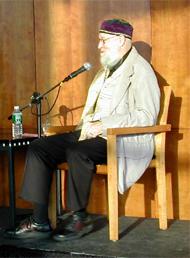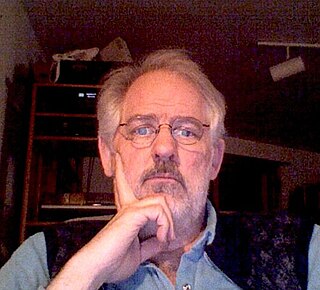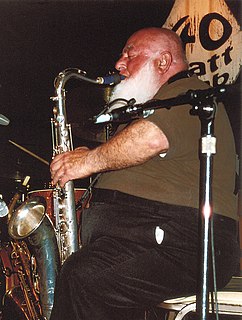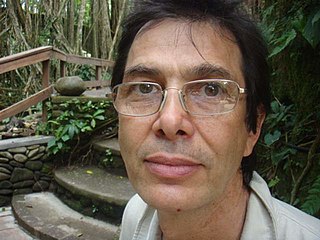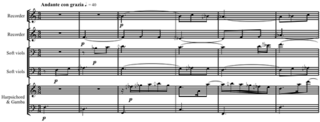| Geoff Smith | |
|---|---|
| Born | 1961 (age 56–57) Brighton, England |
| Occupation(s) | Instrumentalist, composer |
| Associated acts | Attacco Decente |
| Website | www |
Geoff Smith (born 1961) is a musical performer and composer from Brighton, England. He was previously a member of the group Attacco Decente. He was a pupil at Varndean College from 1974.

Brighton is a seaside resort on the south coast of England that is part of the City of Brighton and Hove, located 47 miles (76 km) south of London.

England is a country that is part of the United Kingdom. It shares land borders with Wales to the west and Scotland to the north-northwest. The Irish Sea lies west of England and the Celtic Sea lies to the southwest. England is separated from continental Europe by the North Sea to the east and the English Channel to the south. The country covers five-eighths of the island of Great Britain, which lies in the North Atlantic, and includes over 100 smaller islands, such as the Isles of Scilly and the Isle of Wight.
Attacco Decente were a musical group from Brighton, England, active from 1984 to 1996.
Contents
Smith is considered to be one of the world's leading players of the hammered dulcimer. In performance, he plays three custom-built prototype dulcimers sequentially - diatonic, chromatic and a microtonal model featuring 'fluid tuning', i.e. such that individual notes may be tuned at (by) precise microtonal intervals.

The hammered dulcimer is a percussion-stringed instrument which consists of strings typically stretched over a trapezoidal resonant sound board. The hammered dulcimer is set before the musician, who in more traditional styles may sit cross-legged on the floor, or in a more modern style may stand or sit at a wooden support with legs. The player holds a small spoon-shaped mallet hammer in each hand to strike the strings. The Graeco-Roman dulcimer derives from the Latin dulcis (sweet) and the Greek melos (song). The dulcimer, in which the strings are beaten with small hammers, originated from the psaltery, in which the strings are plucked.
Fluid tuning is a tuning system for the piano and hammered dulcimer. It was developed by Geoff Smith, a composer and musician from Brighton, England.
Smith has also designed a revolutionary new addition to the piano - the microtonal tuning mechanism. [1] This innovation enables the use of fluid tuning on the piano. Therefore, a diversity of bespoke tuning layouts can be explored and created separately for each composition, in contrast to the instrument being creatively limited to 'fixed tuning' and therefore the culturally predominant western chromatic octave.
In music, an octave or perfect octave is the interval between one musical pitch and another with double its frequency. The octave relationship is a natural phenomenon that has been referred to as the "basic miracle of music", the use of which is "common in most musical systems". The interval between the first and second harmonics of the harmonic series is an octave.
Smith's compositions include music for film and dance. His first major solo work was a new soundtrack to Robert Wiene's classic German silent expressionist film The Cabinet of Doctor Caligari. He has performed this soundtrack as a live accompaniment to the film on many occasions. His next project was a new soundtrack to FW Murnau's film Faust, [2] followed by a new soundtrack to Benjamin Christensen's 1922 silent film Häxan . [3] Smith's soundtrack was included on a DVD of Häxan released in 2007 by Tartan Films.

Robert Wiene was a film director of the German silent cinema. He is particularly known for directing the German silent film The Cabinet of Dr. Caligari and a succession of other expressionist films. Wiene also directed a variety of other films of varying styles and genres. Following the Nazi rise to power in Germany, Wiene, who was of Jewish descent, fled into exile.

Faust – A German Folktale is a 1926 silent film produced by UFA, directed by F. W. Murnau, starring Gösta Ekman as Faust, Emil Jannings as Mephisto, Camilla Horn as Gretchen/Marguerite, Frida Richard as her mother, Wilhelm Dieterle as her brother and Yvette Guilbert as Marthe Schwerdtlein, her aunt. Murnau's film draws on older traditions of the legendary tale of Faust as well as on Goethe's classic version. UFA wanted Ludwig Berger to direct Faust, as Murnau was engaged with Variety; Murnau pressured the producer and, backed by Jannings, eventually persuaded Erich Pommer to let him direct the film.

Benjamin Christensen was a Danish film director, screenwriter and an actor both in film and on the stage. As a director he is most well known for the 1922 film Häxan and as an actor, he is best known for his performance in the film Michael (1924), in which he plays Claude Zoret, the jilted lover of the film's title character.
Smith's next film music project was a new score for the oldest surviving animated feature film, Lotte Reiniger's The Adventures of Prince Achmed (1926). Smith premiered the score in 2008.
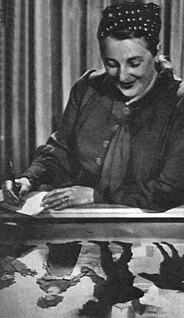
Charlotte "Lotte" Reiniger was a German film director and the foremost pioneer of silhouette animation. Her best known films are The Adventures of Prince Achmed, from 1926—thought to be one of the oldest surviving feature-length animated films—and Papageno (1935). Reiniger is also noted for having devised a predecessor to the first multiplane camera; she made more than 40 films, all using her invention.

The Adventures of Prince Achmed is a 1926 German animated fairytale film by Lotte Reiniger. It is the oldest surviving animated feature film; two earlier ones were made in Argentina by Quirino Cristiani, but they are considered lost. The Adventures of Prince Achmed features a silhouette animation technique Reiniger had invented which involved manipulated cutouts made from cardboard and thin sheets of lead under a camera. The technique she used for the camera is similar to Wayang shadow puppets, though hers were animated frame by frame, not manipulated in live action. The original prints featured color tinting.
Smith has also composed music (Salome) for the Japanese dancer Shakti.
